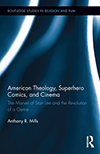- Author(s): Tammie M. Kennedy
- When: 2012-08
- Where: Feminist Formations
As a figure of appropriation, recovery, and reinterpretation, Mary Magdalene illuminates the need to examine how rhetorical practices inscribe and misrepresent historical women in public memory. Analyzing sites of public memory, such as mass media, helps feminist scholars account for not only women who have been forgotten, but also for the ways that women have been misremembered. Using Dan Brown's The Da Vinci Code and Ron Howard's film adaptation of the novel as sites of public memory, the article demonstrates how historical women like Magdalene are constructed and sustained as "facts" that support ideological paradigms and subvert alternative interpretations, or what Michel Foucault describes as "counter-memory." Despite Brown's intention to remember Magdalene in a new way, his contribution to public memory re-inscribes a gendered view that truncates her agency as a woman and leader in early Christianity.








